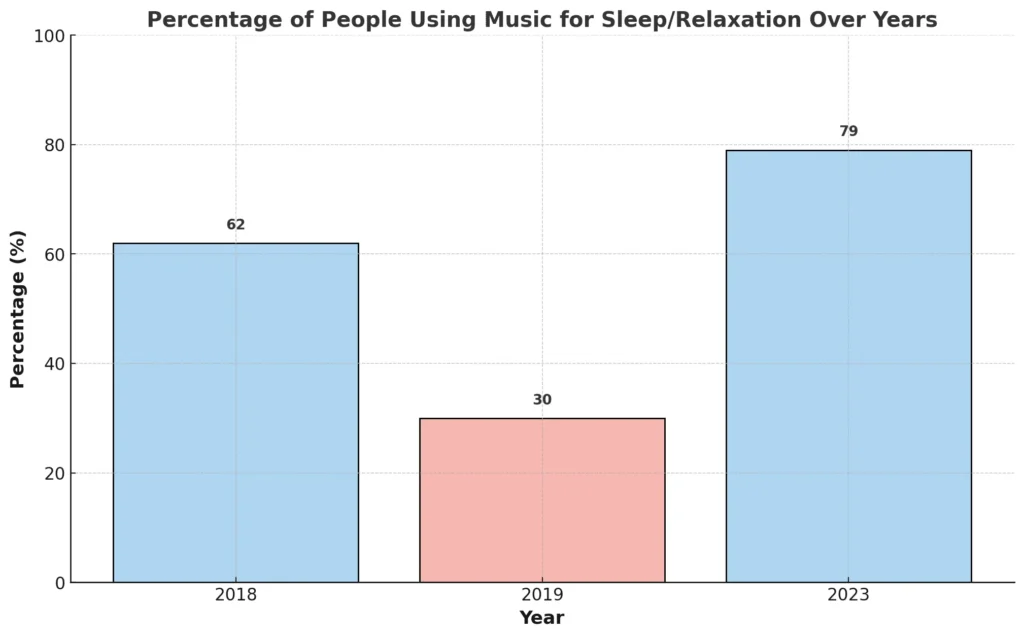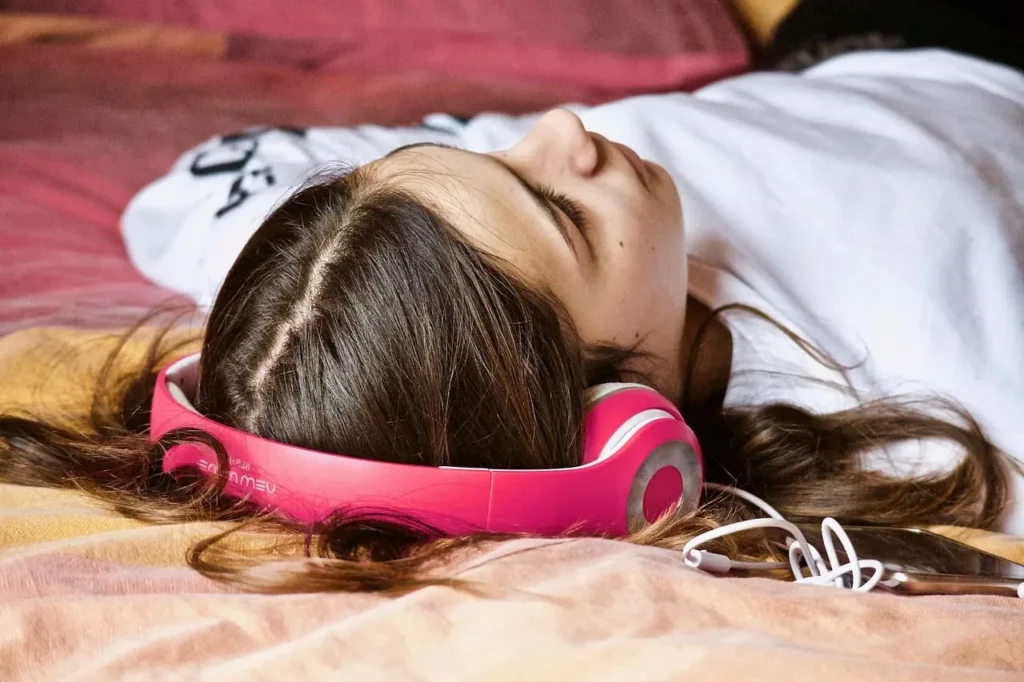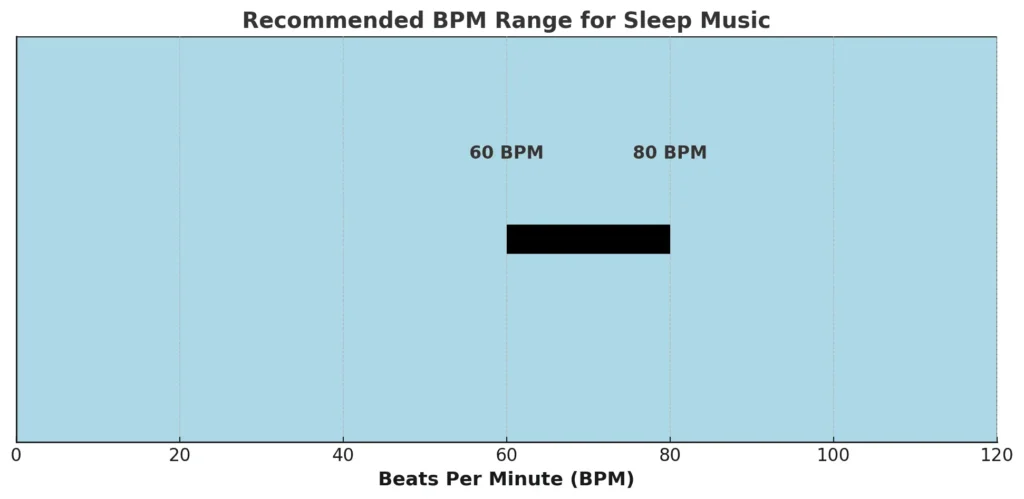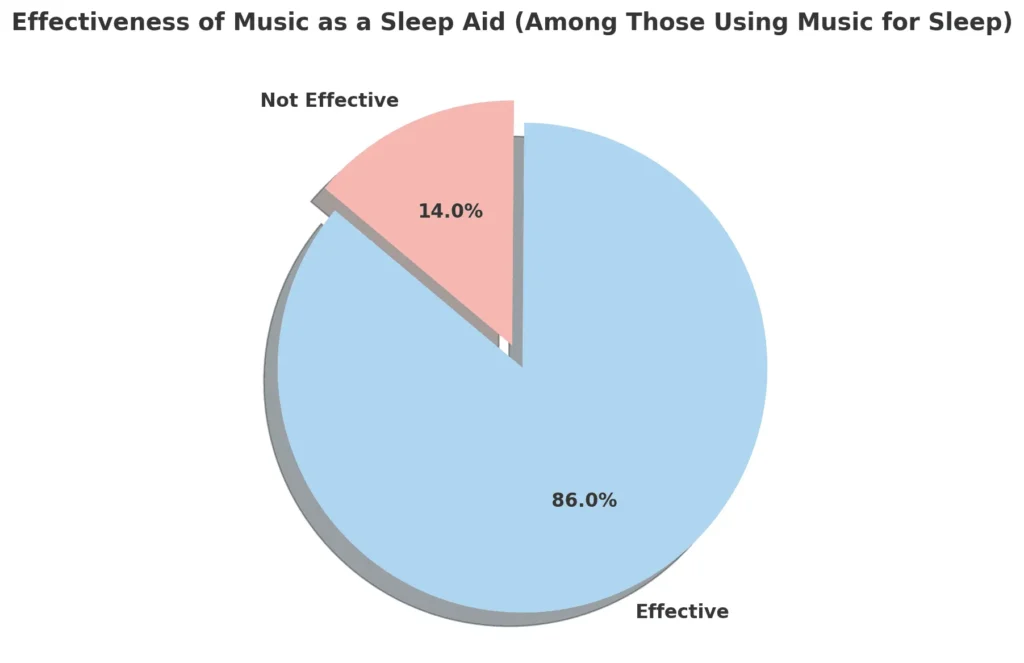
Can music help you sleep?
Have you ever been frustrated lying awake, wondering what the sandman’s secret is? Music may hold the key to lulling you to sleep – and it isn’t just for lullabies! Recent research reveals the science behind how tunes can transform tossing and turning into dreamland drifting. Let me introduce you to its magical power over sleep…
Music has long been known for its ability to evoke emotions and transport us to a different state of mind. But did you know that it can also be a powerful tool for promoting sleep? Research has shown that listening to calming tunes before bed can help you relax, unwind, and prepare your body and mind for a restful night’s sleep.
So how exactly does music work its magic on sleep? Well, it all comes down to science. Music has the ability to slow down our heart rate, lower blood pressure, and reduce levels of stress hormones in our bodies. It can also distract the mind from racing thoughts and worries, allowing us to focus on the soothing melodies and lyrics.
But not all music is created equal when it comes to promoting sleep. There are certain composition trends and genres that are more effective in inducing sleep than others. From slow and gentle melodies to nature sounds and classical music, there is a wide range of options to choose from based on your personal preferences.
And don’t worry, you don’t have to be an expert to reap the benefits of sleep-inducing tracks. With the advancements in technology, there are now countless sleep music playlists and apps available that are specifically designed to help you fall asleep faster and stay asleep longer.
So, if you’re tired of counting sheep and staring at the ceiling, why not give this method a try? In the following sections, we’ll dive deeper into the science behind music and sleep, explore different genres that can help you sleep better, and even recommend some popular songs and artists to add to your sleep playlist. Get ready to experience the power of music in promoting a restful night’s sleep!
The Science Behind Music and Sleep

- This bar chart represents the percentage of people using music for sleep or relaxation across different years.
- The use of music for sleep or relaxation shows variability across the years, with a significant increase in 2023.
- In 2018, 62% of people used music as a sleep aid; this decreased to 30% in 2019. However, in 2023, 79% of respondents reported using music to relax, which could encompass its use for sleep.
Have you ever wondered why listening to soothing music can help you fall asleep faster and have a better night’s rest? Well, there’s actually some science behind it!
Research has shown that music can have a profound impact on our sleep patterns and overall sleep quality. When we listen to relaxing tunes, our bodies respond by releasing hormones like melatonin, which is responsible for regulating our sleep-wake cycle. This hormone helps us feel drowsy and prepares our bodies for a restful slumber.
Not only does music stimulate the release of sleep-inducing hormones, but it also has the power to slow down our breathing and heart rate. This is especially true for slow-tempo songs with a low number of beats per minute. When our bodies are in a state of relaxation, it becomes easier for us to drift off into a deep and rejuvenating sleep.
It’s important to note that not all types of music are equally effective when it comes to promoting sleep. While fast-paced and energetic tunes can be great for waking us up in the morning, they’re not exactly conducive to a restful night. Instead, it’s best to opt for calm and soothing melodies, such as classical music or ambient sounds, which are specifically designed to help lull us into a peaceful slumber.
So, the next time you’re having trouble falling asleep, why not try incorporating some sleep-inducing tunes into your bedtime routine? You might just find yourself drifting off to dreamland in no time!
Music Composition Trends for Sleep-Inducing Tracks
When it comes to creating sleep-inducing tracks, there are certain composition trends that can help you drift off into dreamland faster than counting sheep. These trends have been extensively studied and proven to be effective, so you can rest assured that they will work for you.
1. Slow Tempo: One of the key elements in sleep-inducing music is a slow tempo. Research has shown that slow, relaxing music lower your heart rate and calm your mind, making it easier for you to fall asleep. So, look for tracks with a gentle and unhurried rhythm.
2. Soothing Melodies: Another important factor in sleep music is soothing melodies. Soft and gentle tunes can create a relaxing atmosphere, helping you to unwind and prepare for a peaceful night’s sleep. Look for tracks with simple and repetitive melodies that can lull you into a tranquil state.
3. Nature Sounds: Incorporating nature sounds into sleep-inducing tracks is a popular trend that has gained a lot of attention in recent years. The calming sounds of raindrops, ocean waves, or birds chirping can create a serene ambiance, mimicking the peacefulness of the natural world and promoting deep relaxation.
4. Minimalist Instrumentation: Sleep-inducing tracks often feature minimalist instrumentation, with a focus on a few select instruments. This minimalistic approach allows for a more soothing and uncluttered sound, reducing sensory overload and creating a sense of tranquility.
5. Ambient Soundscapes: Ambient soundscapes, characterized by atmospheric and ethereal sounds, can be incredibly effective in promoting sleep. These soundscapes create a sense of spaciousness and calm, transporting you to a dreamy and peaceful state of mind.
By keeping these composition trends in mind, you can curate a personalized playlist of sleep-inducing tracks that will relax, unwind, and drift you off to sleep with ease.
The Influence of Technology on Sleep Music

Technology has revolutionized the way we listen to music, and it’s no surprise that it has also had a significant impact on sleep music. With the rise of streaming platforms like Spotify and Apple Music, we now have access to an endless library of sleep-inducing tracks at our fingertips.
These platforms also offer curated playlists specifically designed for sleep, featuring soothing melodies and calming sounds. Whether you prefer classical music, ambient sounds, or even nature sounds like rain or waves, there is something for everyone to create the perfect sleep environment.
In addition to streaming platforms, there are also various mobile applications available that focus solely on sleep music. These apps often have additional features like guided meditations, breathing exercises, and white noise options to help you drift off into a peaceful slumber.
Another technological advancement that has influenced sleep music is the development of sleep headphones. These specially designed headphones are comfortable to wear while lying down and offer a seamless listening experience without disturbing your partner.
It’s important to note that while technology can enhance our sleep music experience, it’s crucial to use it mindfully. Excessive exposure to screens and bright lights before bed can disrupt our sleep patterns. Therefore, it’s recommended to create a relaxing routine that includes dimming the lights and putting away electronic devices at least an hour before bedtime.
Exploring Different Genres for Better Sleep

- The chart provides a recommended beats per minute (BPM) range for music conducive to sleep.
- Music with a tempo between 60-80 BPM is often suggested to be effective for sleep.
- The tempo of music can have a profound effect on relaxation. Slow and calming music, especially within this BPM range, is frequently recommended to foster a sleep-conducive environment.
When it comes to using music to help you sleep, exploring different genres can make all the difference. Everyone has different preferences when it comes to their musical taste, so it’s important to find the genre that works best for you.
One genre that is often recommended for better sleep is classical music. The soothing melodies and gentle rhythms of composers like Mozart and Bach have been shown to have a calming effect on the mind and body, making it easier to drift off into a peaceful slumber.
If classical music isn’t your cup of tea, don’t worry. There are plenty of other genres to choose from. Ambient music, for example, is a popular choice for creating a relaxing atmosphere. With its atmospheric sounds and minimal melodies, ambient music can help create a sense of tranquility and ease you into a deep sleep.
For those who prefer something a bit more upbeat, instrumental jazz or acoustic guitar tracks can also be great options. These genres can provide a soothing backdrop for sleep without being too slow or monotonous.
Ultimately, the key is to experiment and find what works best for you. Don’t be afraid to create a playlist with a mix of different genres and see which ones help you relax and unwind. Remember, the goal is to find music that promotes a sense of calm and tranquility, so choose songs that resonate with you and make you feel at ease.
Popular Songs and Artists for a Good Night’s Sleep
When it comes to getting a good night’s sleep, finding the right music can make all the difference. Whether you prefer soothing melodies or gentle instrumentals, there are plenty of popular songs and artists that can help you drift off into dreamland. Here are a few favorites:
Weightless by Marconi Union: This ambient track has been scientifically proven to lower heart rate and reduce anxiety, making it the perfect choice for relaxation and sleep.
Erik Satie: Known for his minimalist piano compositions, Satie’s music is gentle and calming, providing a peaceful backdrop for sleep.
Enya: With her ethereal vocals and soothing melodies, Enya’s music has a magical quality that can transport you to a tranquil state of mind.
Max Richter: Richter’s ambient compositions, such as “Sleep” and “From Sleep,” are specifically designed to be played while you sleep, creating a peaceful atmosphere throughout the night.
Debussy: Known for his impressionist style, Debussy’s delicate piano pieces, like “Clair de Lune,” evoke a sense of serenity that can drift off to sleep.
Remember, the key to finding the right sleep music is to choose tracks that are calming and gentle, with a slow tempo and minimal lyrics. It’s also important to create a sleep-friendly environment by dimming the lights, using comfortable bedding, and turning off any distractions.
So, the next time you’re struggling to fall asleep, give these popular songs and artists a try. Let their soothing melodies guide you into a restful slumber and wake up feeling refreshed and rejuvenated. Sweet dreams!
Creating a Sleep-Friendly Environment with Music

- The pie chart visualizes the effectiveness of music as a sleep aid among those who utilize it for this purpose.
- A vast majority (86%) of respondents found music effective for aiding sleep.
- This statistic indicates that for those who turn to music as a sleep aid, it’s generally a beneficial strategy.
So, you want to make your bedroom a sleep sanctuary? Look no further than the power of music! Creating a sleep-friendly environment with soothing tunes can work wonders for your sleep quality. Let’s dive into some tips and tricks to set the stage for a peaceful slumber.
1. Keep it Calm and Quiet
When it comes to sleep, silence is golden. Opt for instrumental tracks or songs with soft vocals to create a calming atmosphere. Avoid songs with loud beats or energetic melodies that may keep you awake. Remember, the goal is to relax your mind and body.
2. Choose the Right Tempo
The tempo of the music you choose can greatly impact your sleep. Slow, steady rhythms mimic the body’s natural resting state, helping to slow down your heart rate and relax your muscles. Look for songs with a tempo between 60 to 80 beats per minute to enhance your sleep-inducing experience.
3. Embrace Nature’s Symphony
Nature sounds, such as raindrops, ocean waves, or gentle bird chirping, can be incredibly soothing. They create a serene atmosphere and drown out any background noise that might disrupt your sleep. Consider adding nature-inspired tracks to your sleep playlist for a touch of tranquility.
4. Use White Noise Wisely
If you find it challenging to fall asleep in complete silence, white noise can come to the rescue. White noise machines or apps generate a consistent sound that masks other noises and helps you sleep. Experiment with different types of white noise, like fan sounds or rain showers, to find what works best for you.
With these tips, you’re well on your way to transforming your bedroom into a sleep oasis. Remember, everyone’s preferences are different, so feel free to customize your sleep music playlist to suit your individual tastes. Sweet dreams!
We’ve uncovered how melodies can transform tossing and turning into dreamland drifting. While other strategies work for some, music provides a natural, customizable solution through soothing songs and specially crafted playlists.
Final thoughts
So don’t wait until your next sleepless night to give your newfound musical knowledge a try. Get in a relaxing rhythm now for well-rested mornings ahead. Your zzz’s are just a playback away when guided by genres, trends, and tunes tailored just for you.
Should insomnia ever interrupt again, a simple playlist selection will have calming compositions carrying you back to Dreamville. Music truly holds the magic to ease even the most restless of nights. Sweet dreams and sleep well!
From the bustling city of Mumbai, I am a professional Composer, Producer, and Educator with a wealth of expertise in the industry. With over 15 years of experience and a diverse portfolio including composing for movies, television, web series, songwriting, music production, and creating meditation music. I also love to teach music and musicality to students worldwide. When I’m not in the studio, you can find me doing music consultancy for independent projects and exploring the intersection of Space & Spirituality.

